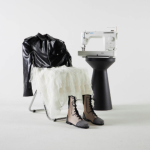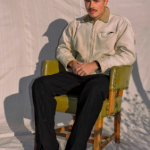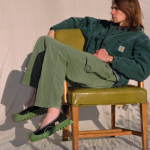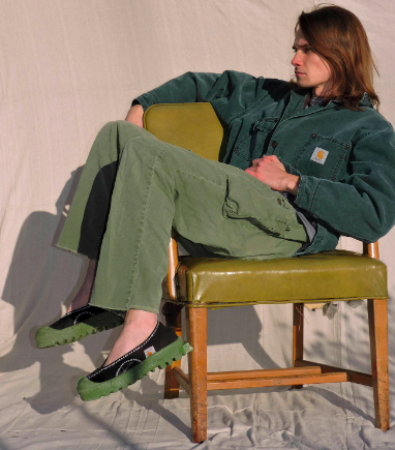In an innovative and unique collaboration between CCS and Carhartt this past semester, fashion students were challenged to create new zero-waste concepts designed for urban farmers, seamstresses, factory workers and more using dead stock clothing items and scrap materials provided by Carhartt.
Students implemented unique practices such as fabric dyeing with food scraps, digital printing, laser perforation and weaving with fabric scraps to add interesting design elements without sacrificing the environment.
The results?
“The outcome was utterly surprising and pleasing,” said Aki Choklat, Linda Dresner Endowed Chair in Fashion Design at College for Creative Studies, “I am so proud of the students. They took scrap materials and turned them into quality, functional, high fashion workwear apparel which is a category these students typically don’t work with.”
Choklat is not alone in realizing the uniqueness of the collections. The students and their pieces are headed to Italy in June for a world-renowned invitation-only fashion trade show.

CCS CARHARTT COLLECTION
Says Choklat, “It’s fairly unheard of for students to be invited to this prestigious event and we are thrilled to be representing the Carhartt brand, the school and the city of Detroit.”
The concept of this project was born between long-time colleagues and friends Choklat and Ben Ewy, VP of Global Product Design Research and Development for Carhartt who also sits on the fashion department’s board at CCS via Choklat’s invitation.
“Ben and his team gave CCS a brief and a large amount of Carhartt fabrics and clothing and samples and said here you go. We spread everything out and categorized the materials, broke the students into teams and told them to go for it.”
Go for it they did. Each group of students created one to three items, each team designing for a different workforce category, with functionality and sustainability at the forefront of their ideations. Some of the many exceptional items they developed include:
- Tough Toe Oxford: This workboot-meets-classic-oxford hybrid shoe utilizes repurposed duck canvas to create a functional, classic silhouette.
- Deconstructed Work Apron: This two-piece apron combines bright contrast stitching with artistic camo for a set workers can utilize in their day-to-day. The unique, deconstructed design with a v formation on the bottom half and layered pockets allow for maximum mobility and storage.
- Taro Detachable Pants: Students utilized food scraps from beets and red cabbage to dye snap-button convertible pants that can transition into shorts, to bring new life and color to the preexisting duck canvas fabric used.

CCS CARHARTT COLLECTION
The interdisciplinary and inter-departmental aspects of the project made it unique as well. The project included both BFA Fashion Design and MFA Color and Materials Design students.
To begin with, Choklat had students develop mood boards and personas for the collections. And further, students were urged to go and meet these people and see how they operate and work.
About the process, Choklat says, “It’s really important that the students learn through experience, through active engagement with the community and with a brand.”
He goes on to say,
It was also extremely valuable for students to have the ability to rip something apart that has been used and understand the durability comes from and where the function comes from. Investigate how the seams are stitched and reinforced. Resilience and sustainability have to be ingrained in every practice we do as designers… the way you cut, what you do with remnants, where you put the trash. The students are very aware of this.
Regarding the implications the project had for all involved, Choklat says, “This big educational institution and an iconic Detroit brand came together and reached out to important parts of our culture like urban farming and the working man and woman. All of this collaboration and the experiences gained build a bigger foundation for Detroit. I think Detroit is at a tipping point, and there is a global interest, and education is the foundation of that.”

CCS CARHARTT COLLECTION
The class will be held again in the fall semester and Choklat says it will have an even bigger focus on community. He says, “There is so much we can see and learn from our city, and that will be a really fun piece to emphasize.”
As always, be sure to subscribe to our newsletter for regular updates on all things Detroit.






















